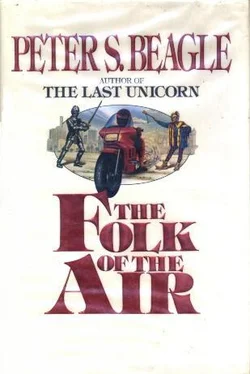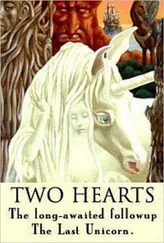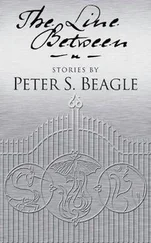Farrell was running by then, half-crouched, hands guarding his face, struggling through blackberry, hemlock, and wild lilac, falling once and having to make sure that the lute was all right, and hearing himself making small noises like a garden hose or a steam radiator that has not been quite shut off. Away to one side, there was an immense crashing and stumbling that must surely be Crof Grant in flight, while behind him he heard only Aiffe’s whooping, shuddering laughter. But he knew who was pursuing him as clearly as he had suddenly known who they were: the real thing, genuine gunslingers out of the genuine Middle Ages, out of the Crusades, the Spanish Netherlands, the Wars of the Roses. Unpretentious, unwashed, unmerciful—the real thing, ready for bear. Lady Kannon, pity now . At that point, he dodged around one tree cheek-first into another and spun back to the first tree, slipping down against it, still reaching to shield the lute.
He lost color for a little while. When he could stand, three gray people were almost on him. The one closest might have been a pilgrim turned mercenary or a Norman invader of Sicily. Under a steel cap, he had a square, windburned face with flat cheekbones and tufty eyebrows, and his look was so peaceful and humorous as to be called insane. Farrell picked up a dead branch, watching with numb, patient curiosity as the man came on, noting equally the slight bend of the knee, the seemingly loose grip on the sword, and the flakes of dandruff in the pale eyebrows and mustache. The sword had a raw, winking notch near the tip, and the unbound pommel looked like an old brass doorknob. Farrell wondered whether the light reflected into his own face came from the setting sun of Avicenna or Palestine.
He held up his branch as the sword started back. It moved unnaturally slowly, the knight’s lips wrinkling with the same deliberation, his body setting itself for a sidearm blow. Then Crof Grant was trundling between them, grappling fearlessly for the sword and rumbling out, “Fye na, haud ye’er brand for sair shame. Tis a naked museecian, man—would ye harm a sleekit, cow’rin, tim’rous minstrel?” The dreadful bonnet was gone, and his white hair kept falling into his eyes. The knight growled very softly and stepped away from him, moving up on Farrell from another angle. Grant was after him again, partially interposing his slow, shrouded body, “Nay, I say ye shanna‘! I say haud! Dinna ye ken League rules, man?”
The sword melted into the side of his throat, and he slapped vaguely at the wound before he stumbled down. Color came back with his blood.
Farrell never remembered how he reached the castle; only that he was not followed, and that he was crying when he got there. Ben held him on his feet and almost literally translated his near-hysterical report to Simon Widefarer, but no one else, except Hamid, seemed to take any of it seriously. He was reassured on all sides that Crof Grant could not possibly be really dead, that metal swords were never allowed in League combat, and that neither captain would even consider enlisting new fighters, once a war was under way. As for Aiffe’s monstrous sendings, the minority willing to discuss them at all favored mass hallucinations brought on by uniform minor sunstrokes, such as had been happening all afternoon. Meanwhile there was a last stand to prepare for, and a serious need of heartening music. Hamid looked down at him from a teetery catwalk, saying nothing.
The attack came no more than twenty minutes before sunset. There was no attempt at surprise; rather, the surviving knights of Garth de Montfaucon’s party—still fewer than Simon’s forces, and looking even more spent—approached the castle boldly, stepping with a slow, menacing rhythm and chanting grim burdens to keep time. Garth himself swaggered in the lead, but Aiffe and Nicholas Bonner walked unobtrusively to one side in their anonymous squires’ dress, followed by the five men she had summoned to her. On the catwalk, Farrell said to Hamid, “That’s the one. Second on the left, the short guy.” He thought that Aiffe looked anxious and subdued. Hamid said without expression, “I don’t want him to be dead. I don’t want to predict anyone’s death.”
“He’s dead, all right,” Farrell said.
Garth drew his troops up before the outer wall and stood forward, calling, “Now stand well away, of your kindness, for we’d see none injured when the walls come down.” Farrell knew that a battering-ram entry was as much a tradition of League wars as ransoms and victory feasts, but no ram was visible among the attackers. Nevertheless, there were knights on the wall who began to back away.
“Steady all,” Simon shouted, “Give them no heed, but look to your bowstrings.”
Aiffe kissed both of her hands loudly and blew the kisses toward the castle, spreading her arms to wave them on their way. The inner and outer gates fell down flat, and Garth’s men swarmed in through the rising dust.
Simon Widefarer and his archers fired frantically into the first rush, dropping a few as they scrambled over the gates. After that there was no free play, even for the morgensterns, and no room for referees. The castle seethed and rocked like a subway car at rush hour; fighting knights were hurled apart, unable to find their combat again, or stumbled together straight through someone else’s mêlée, and were cut down by their comrades, as likely as not. For those who fell, there was a very real danger of being badly trampled, and Farrell and Hamid hauled several such as far out of range as they could. They were huddled in a rear corner, Farrell curled protectively around the lute, Hamid jauntily crosslegged, still taking notes aloud. The dust went up elegantly, orange and gray, poising just over the scene like the fighter’s breath.
“Here they are,” Hamid said softly, and Farrell looked up to see Aiffe’s five summonings passing through the ragged gateways, three abreast, two following singly, moving into the battle as delicately as cats stalking a birdbath. Farrell was fascinated to see how much like any costumed bank managers they looked, even knowing what he knew. Hamid said, “All more or less from the same time period. I make it one Norman, one Venetian free-lance, two early Crusaders, and I don’t know what your boy there is, except nasty.” They both stood up as he want on musing. “Wonder how she handled the shock factor. They look pretty cool, considering they surely had other plans for the afternoon.”
At the top of his lungs, Farrell shouted the first word that came to him. “ Realies !” Hamid burst out laughing, but no one else paid the least attention. Farrell yelled, “Real swords, ringers, look out, they’ve got real swords!” The five men spread out, choosing their targets. The Venetian went for Simon Widefarer, and the one who had killed Crof Grant came straight toward Farrell and Hamid.
Hamid said, “Some day we got to talk about whether it was really necessary for you to do that.” The Norman caught William the Dubious with a side cut that doubled him over, then aimed a finishing blow meant to shatter his helmet. The man who had killed Crof Grant blocked Farrell’s view. He looked happy and zestful, as if he were meeting dear friends at the airport.
As the sword began to come up, Hamid chanted loudly, “Hate to talk about your mama , she’s a good old soul,” and danced away to Farrell’s left. The sword flickered involuntarily to follow him, and Farrell shoved the lute into the man’s face, knocking the steel cap sideways. Everything in him screamed against the idea of using the instrument as a weapon; but he thought about vain, rumbling, ridiculous Crof Grant trying to protect him, and he hit his killer in the head with the lute as hard as he could. The beautiful elliptical back caved in as the man wandered to his knees. Farrell hit the man a second time before Hamid yanked him away from there.
Читать дальше












